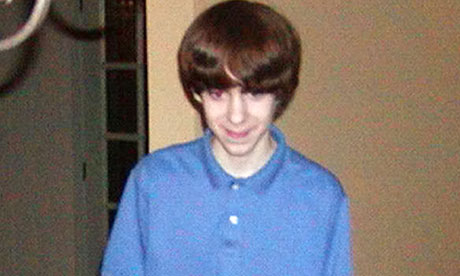WAR ON CRAZY-We can longer no allow sick individuals like Adam Lanza to go on untreated | Matthew Lysiak | Comment is free | theguardian.com

Adam Lanza, 20, used three weapons to shoot 26 people dead, 20 of them school children, and then shot himself at Sandy Hook elementary school in Newtown, Connecticut. Photograph: Enterprise News and Pictures
There is a powerful lesson that can be learned from the tragedy of 14 December 2012, but while our attention has focused on gun legislation and tightening up school security measures, my fear is that we have neglected the problem at the core of this recent spat of mass shootings; the fatal flaw in America's mental health system.
In the case of Adam Lanza, we have a young man who had been suffering from mental illness since childhood. From a young age, the smallest sense of touch, light, or sound could be enough to cause him to withdraw completely into isolation. As he got older, that isolation grew into obsessions over mass killers and weaponry.
In the months before the killing, Adam was left alone in his room. Black garbage bags covered the windows to keep out the light. He spend hours playing violent first-person video games, where he held a gun in his hand, shooting his way through human after human. He had cut off those closest to him, his father, brother, and in the final months, his mother, Nancy Lanza.
We know that Nancy Lanza recognized early on that her son was suffering from mental illness. We know she had sought professional help. Remarkably, we also know that Adam was not on medication or being treated.
How could this happen?
Adam Lanza is just the latest mass shooter to suffer from severe mental illness. We saw Aaron Alexis, the man who shot up the Washington Navy Yard in September, who believed people were tracking him by sending vibrations through microwave ovens into his body. There was James Holmes who shot up an Aurora, Colorado movie theater, Jared Loughner, the shooter from Tucson, Arizona, and the Virginia Tech shooter, Seung-Hui Cho.
While violence overall has been trending downward, the list of carnage caused by mass shootings continues to escalate.
Over the last three decades, the overall national homicide rate has fallen from 10 per 100,000 in 1980 to 4 per 100,000 today, but the number of mass shootings has risen from 4 per year, between 1900 and 1970, to 29 per year since then.
It is no coincidence that this rise correlates with the closure of the mental health institutions in 1969. After they were shuttered, they were supposed to be replaced by community outreach programs. Sadly, these programs never took root and many parents who are dealing with severe mental illness feel they are out of options.
Many of the parents I've spoken to fear their mentally-disturbed son or daughter might be capable of committing a terrible act of violence, but without the mental institutions, in many cases their only alternatives are the emergency room or law enforcement, neither of which are equipped to deal with those suffering from severe mental illnesses. In large part, that void has been filled by the United States prison system.
Debates over school security and guns are both important issues in their own right, but let's not fool ourselves; the next mass shooter is out there. He is plotting. Like those before him, there is a high probability he is suffering from severe mental illness, and, also like these others, his sickness is not being treated.
My fear is that if we don't act, we are in the midst of a trend that is poised to continue well into the foreseeable future. Until we deal with the issue of what to do with those suffering from mental illness who remain untreated, we can expect this pattern of mass shootings to continue.
If Americans are serious about stopping the next mass shooter, they will finally decide to do something about the dangerously mentally ill. The Avielle Foundation, named after Avielle Richman, a victim at Sandy Hook, is looking into the field of mental health for proactive ways to prevent the next tragedy.
The statistics are shocking: one in five adults experience a mental illness and forty-five million Americans suffer from depression, anxiety, schizophrenia, or PTSD. The majority of those suffering with mental illness will go untreated. Reaching those who are untreated will go a long way in not only preventing future mass killings, but unleashing this group of productive individuals back into our society.
The mission of The Avielle Foundation, as described on its website, "is bridging behavioral and biochemical sciences" and decreasing the "shame, secrecy, and stigma associated with brain illness; and ultimately facilitate appropriate early-identification and prevention/intervention methods to prevent violence".
Simply put, the lesson of 14 December 2012, is that we no longer have the luxury of allowing sick individuals like Adam Lanza to go on untreated.
• This article was updated on 14 December 2013 to correct an error in the headline.